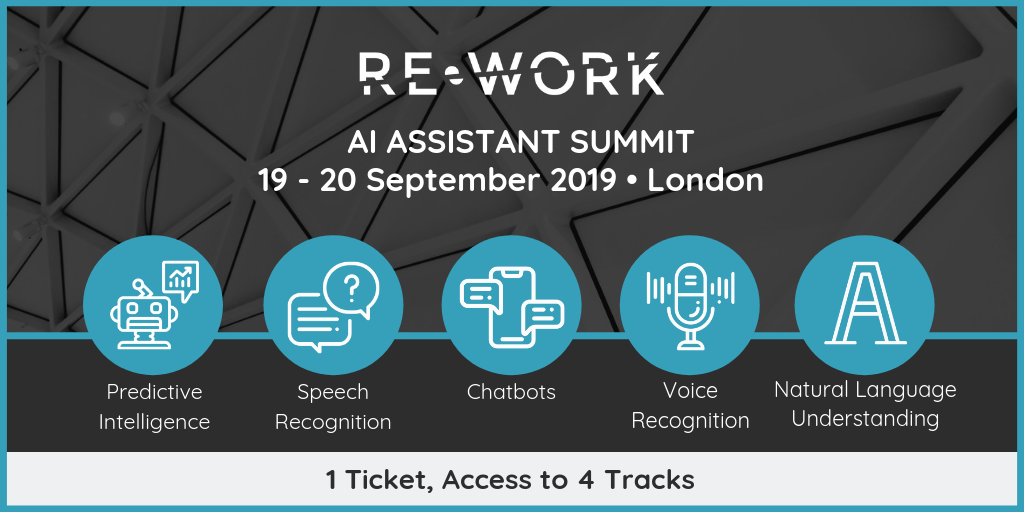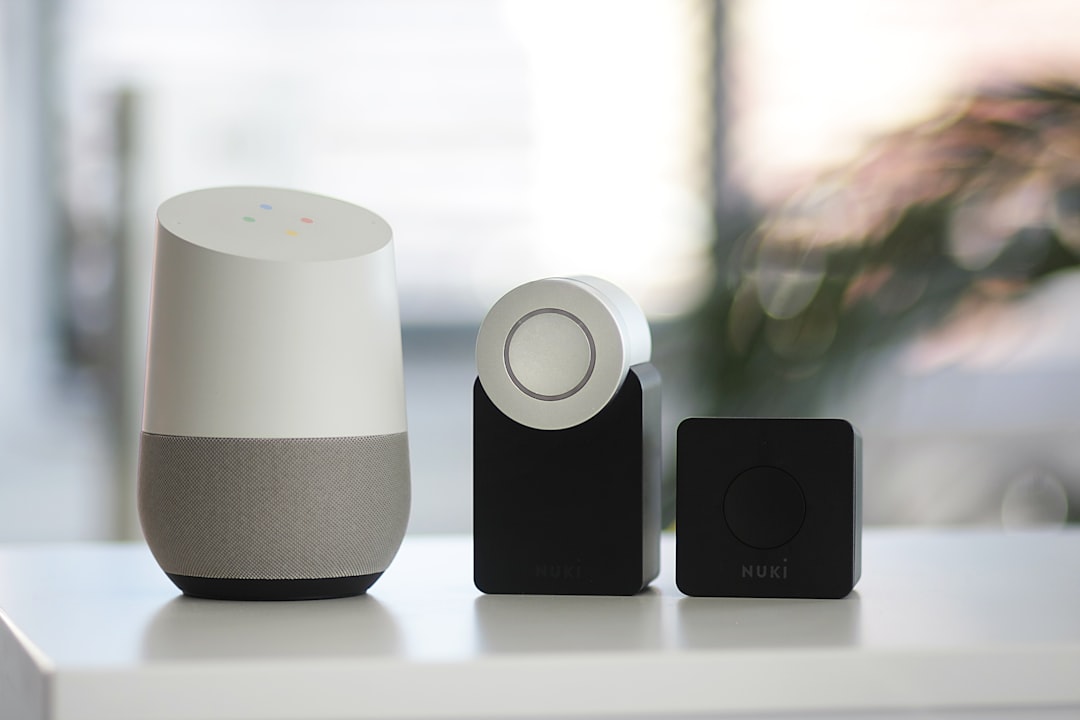By 2024 the global AI market will be worth $71 billion. AI assistants make up a huge portion of this, both in the form of personal devices (168.6 million smart home devices have been shipped in the first quarter of 2019 which is a 27.3% increase on last year) and in business with industries such as finance, healthcare and education utilising the technologies to improve business efficiency and cut costs.
At the AI Assistant Summit in London this September 19 - 20, experts in the creation and application of these virtual assistants will come together to share the most cutting edge progressions in the space. The first day of the summit will see 600 attendees across 3 tracks learn about the current landscape of AI assistants and the latest research advancements, and the second day will hone in on industry applications, startup showcase & exploring the next generation of AI assistants.
As well as accessing presentations from the AI Assistant Summit, attendees passes include the Deep Learning Summit and the AI in Retail and Advertising Summit, plus the additional Deep Dive track. With over 90 expert speakers from the likes of Dyson, DeepMind and Salesforce Einstein sharing their knowledge, all three tracks offer insights to the most cutting edge progressions in AI and deep learning. Not sure how you’re going to spend your time at the summit?
Check out the schedule here, and take a look at our suggestions…
If you’re a Data Scientist or Engineer...
On Device Neural Networks for NLP, Day 1: 09:50
Deep neural networks mimic the function of the human brain, with Google’s on-device text classification AI achieving 86.7% accuracy. There are, however, significant challenges in deploying neural networks on-device such as the small memory footprint, interference latency and much lower computational capacity and power compared to high performance systems on the cloud such as GPUs and CPUs. This session will hone in on some of the challenges and solutions in the space looking at how NLP systems can reach the maximum efficiency and accuracy whilst running neural networks on-device.
Machine Learning for Conversational Assistants: How Far Can We Get?, Day 1: 12:40
Customer support response times have been hugely improved by the advent of on-site chatbots answering questions from ‘how do I create an account?’ to ‘how to I recover my password?’ and everything in between. This has been made possible by recent advances in machine learning. As we all know, however, when the dialogue gets more complex the machines begin to struggle and hand you off to a human assistant. In this session, Verena Rieser Professor in AI at Heriot-Watt University will summarise results from her End-to-End NLG Challenge for presenting information in task-based dialogue systems. She will also report her experience from experimenting with these models for generating responses in open-domain social dialogue as part of the Amazon Alexa Prize challenge. Finally, she will discuss future challenges when learning from data. Throughout the session, experts will explore obstacles such as spelling errors, syntax, colloquialisms and look into the capabilities of machine learning to adapt to different variables.
Behind the Scenes - Salesforce Voice Assistant, Day 1: 16:00 - Deep Dive track
“Using Deep Learning technology, we intend to transform unstructured data like voice and text to more structured data which empowers users to execute actions. This is a huge problem statement in itself even if one company was to build an assistant to interact with their organization, but it is even more challenging to build this as a platform while being agnostic of underlying details.”
This session is suitable for an audience with have some amount of technical knowledge as it would entail different parts required to build such an assistant.
If you’re a Founder...
The State of Natural Language Understanding: Past, Present and Future, Day 1: 09:50
The pace of progression in NLU is rapid. This is not only a challenge for experts working in the field, but even more so for those keen to employ the technologies in their business without quite knowing where to start. Without in-depth experience and a prior understanding of the technicalities it can be challenging to know quite where to begin, so this session will give an overview of the progressions in NLU, where we currently stand, and look at some of the most progressive research being done today to bring us the future of the technology.
Startup Sessions, Day 2: 09:25
Some of the most exciting emerging research and applications in AI assistants come from leading startups in the field. On day 2 of the summit we will hear about some of the brightest startups using virtual assistants in their work. Sessions will include: Simplifying and Personalizing Travel with AI and Chatbots, How to use the Thousand Words of an Image to Power a Fashion Shopping Chatbot, Helping Students Chat Their Way to a College Degree, Transforming Healthcare Using AI Assistants and AI Assistants to Combat Loneliness.
Application of AI Assistants in Industry, Day 2: 11:20
Having founded your own company, it’s easy to become absorbed in your own industry without looking at transferable methods across different areas. For example, you’re working with personalised recommendations in fashion and spend your time looking at competitors in this space, but an education company may be manipulating their assistants with a model that’s directly applicable to your current challenges. Sessions will be: AI Assistants in the Job of Home Security, Artificial Communication Intelligence 2.0 – The Rise of Socio-Emotional Assistants, VPA for Infotainment and Seamless Driving Experience and Predictive Commerce Technologies and Shopping Assistants.
If you’re a VP...
Democratising Conversational AI, Day 1: 10:15
The frequency at which small companies and giant corporations are employing AI assistants has boomed in recent years, but the technology hasn’t quite been there for conversational AI to hold its own without human support. However, just this year ‘the massive democratisation of plug-and-play conversational AI platforms and the frequency with which companies have contributed immensely to enable easy development of conversational applications has led to its robust growth.’ Conversational AI is no longer a gimmick or a novelty, and with the ability for bots to manage multiple queries and a high influx of traffic simultaneously makes it extremely attractive in scaling customer support.
Integrating AI Assistants into Your Business, Day 1: 16:15
As with any technology, it’s essential to ensure that it’s being rolled out in order to solve challenges and increase efficiency or cut costs rather than teams working on models because it’s ‘fashionable’ or attractive to be seen as an ‘AI company’. This session will look at the most effective ways to incorporate AI into your business where it’s really needed to streamline processes. Experts will look at how both small and larger businesses can use AI assistants, where the challenges lie in those all important teething stages, and how, once you’re all set up, this can be scaled.
Building Neural Conversational Machines at Scale
Following on from the initial development of AI assistant models, we will look at the later stage elements of the systems. Building real-world Conversational AI systems at scale and from “scratch” remains a daunting challenge as it requires us to deal with ambiguity, data sparsity and solve complex language, dialog and generation problems. We will look at the neural structured learning frameworks that tackle the above challenges by leveraging the power of deep learning combined with graphs which allow us to model the structure inherent in language and visual data.
At the summit you’ll also have the opportunity to engage with the experts in Q&A sessions after each talk, in the interactive workshop sessions and in the 12+ hours of networking. This event will sell out, so register now to guarantee your place at the summit in London this September. Early Bird discounted passes are available until next Friday, July 26.

